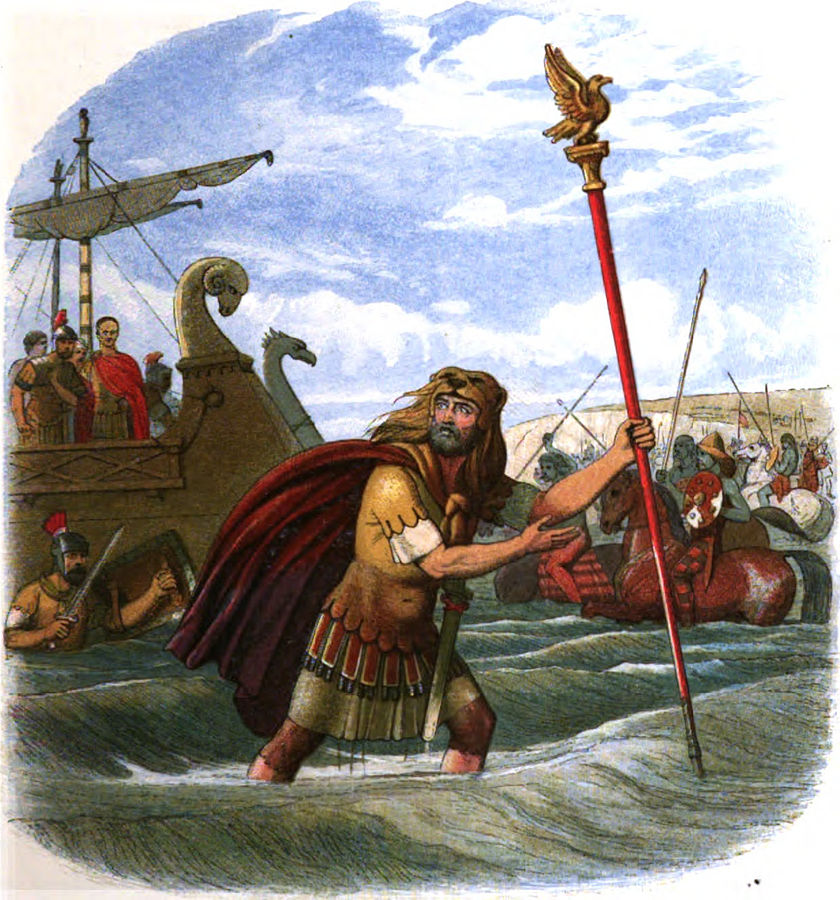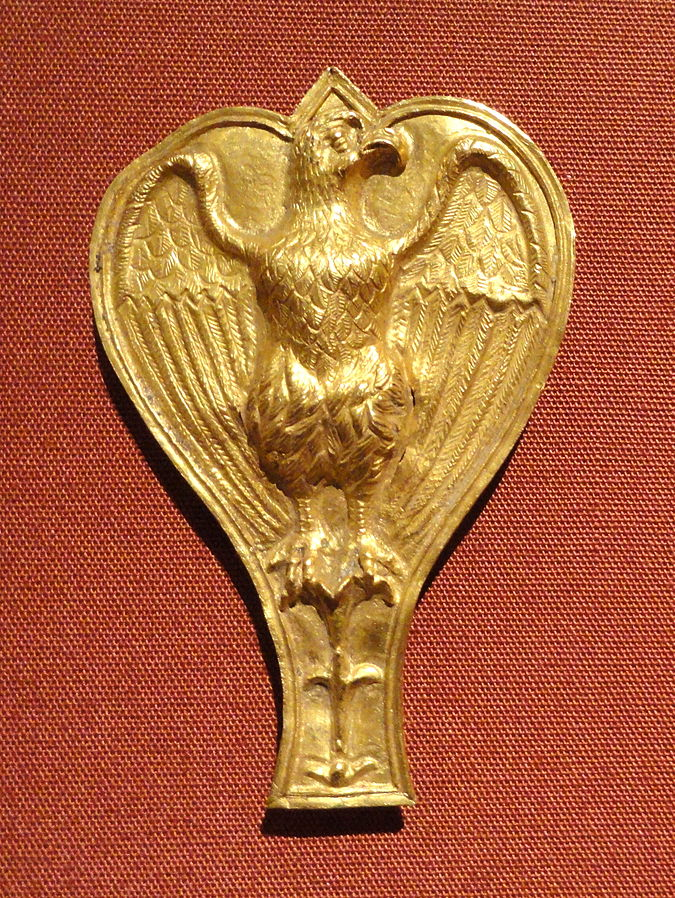Jack Marso
Riya Patel
AP Latin 🏛
24 resourcesSee Units
Book IV: 55 B.C
Chapters 24-25
Julius Caesar’s conquest for Gaul was obstructed by the opposition of the Britons. The Britons had supported the Gauls during Julius Caesar’s campaigns while the leading Gallic trade supplier, the Veniti of Amorica, called in the Britons as allies. As arrangements were made to set forth for Britain, he set forth Gaius Volusenus, a tribune, to gather information on the Britons, although some merchants informed the Britons of Caesar’s intentions. Two legions and eighty transport ships arrived, and the process of Roman disembarkation was in effect. Let’s see how this plays out.
Make sure to check out Gallic War, Book 4 Chapters 24-25!
Chapter 25 Lines 7-16
Nam et navium figurā et remorum motu et inusitato genere tormentorum permoti barbari constiterunt ac paulum modo pedem rettulerunt. Atque nostris militibus cunctantibus, maxime propter altitudinem maris, qui decimae legionis aquilam gerebat, obtestatus deos ut ea res legioni feliciter eveniret,
“Desilite,” inquit, “milites, nisi vultis aquilam hostibus prodere; ego certe meum rei publicae atque imperatori officium praestitero.” Hoc cum voce magnā dixisset, se ex navi proiecit atque in hostes aquilam ferre coepit.
- Why would have the Roman troops still hang back after Caesar clearly had altered their landscape to provide for strategically military success in lines 1-2?
- Based on your knowledge of Roman history and your understanding of Latin texts, what can you assume the purpose of the eagle-bearer is?
- What does the eagle-bearer refer to as “my country and my general” in line 8-9?
- Based on your knowledge of Greek and Roman history, why did the eagle-bearer carry the eagle as the specific animal?
- What does Caesar mean when he remarks that the eagle-bearer put himself and the eagle against the enemy in lines 9-19?
Answers (Don't peek!👀)
- The process of Roman disembarkment was difficult and tedious for the soldiers. They were being oppressed by the Britons, who had dry land and were able to freely hurl their weapons as the Roman soldiers battled their way with the weight of their armor and weapons while traveling with limited utilization while in the water. This certainly spooked and frightened the Roman soldiers, thus, even though it seems like this situation is too good to be true, they were still hesitant.
- The eagle-bearer or the aquilifer is a soldier that bears the eagle from the Roman legion. They were crucial to the success of the Roman legion and the eagle was such a prominent possession, to the point that losing it would be disgraceful. On the Roman military hierarchy, it was ranked just below the centurions, the commander, and the just above the optiones, the executive officer. Simply, they are the focal point of the legion’s honor, which is shown by his prayer to the gods to sway the legion’s actions in success
- Rome and Julius Caesar
- The Latin word aquila means eagle. The eagle was the patron animal for the Greek god, Zeus, or the Roman equivalent, Jupiter. The eagle is also commonly known for being the king of birds, similar to that as the lion being the king of animals. The eagle was being shown to remind the Roman soldiers of the homeland and their general, who, Julius Caesar, was also a Roman consul that formed the First Triumvirate
- Caesar characterizes the eagle-bearer as attempting to shift the tide between the Romans and the Britons. He’ll lead the enemy troops from his legion and the accompanying Roman ships onto the shore to gain a land military advantage against the enemy, where they are historically superior. The Roman soldiers have been clueless in the process of disembarking, and after suddenly shifting their approach to the enemy’s open flank, the Roman soldiers clearly have some delay in order to not get exploited by the Britons any longer. Without his verbal cry and his actions, the Roman soldiers would have waited for someone else to step in, most likely Julius Caesar, but the result could have been drastically different. It’s a true sign of how powerful Roman religion and culture tie into their military, and how these symbols and signs affect their lifestyles and the decisions they make.
Chapter 24 Lines 5-13
Erat ob has causas summa difficultas,
quod naves propter magnitudinem nisi in alto
constitui non poterant, militibus autem, ignotis locis,
impeditis manibus, magno et gravi onere armorum
oppressis simul et de navibus desiliendum et in fluc
tibus consistendum et cum hostibus erat pugnandum,
cum illi aut ex arido aut paulum in aquam progressi
omnibus membris expeditis, notissimis locis, audacter
tela coicerent et equos insuefactos incitarent.
Translate these lines as literally as possible
Translation (don’t peek👀!) Remember if you have different words than I did, that’s perfectly acceptable! Just make sure they have the same meaning attached to them.
Disembarkation was the hardest difficulty, for the following reasons, specifically, due to our ships, based off of their massive size, could be located only in deep water; and our soldiers, in geography incomprehensible to them, with their hands not free, oppressed with a great and grievous weight of armor, had at the simultaneously to jump from the ships, stand within the waves, and confront the enemy; while they, either on dry land or proceeding hardly any into the water, liberated in all their limbs in locations deeply recognized to them, could emphatically hurl their missiles and spur on their horses, which were customary to this kind of practice.
Breakdown of Chapters 24-25
- The Romans are in the midst of searching for a safe spot to disembark the soldiers. However, the Britons understood the tides of the ocean and how it could provide a favorable advantage for the soldiers to disembark on even shore, and “comprehended the design of the Romans.”
- In action, the Britons ordered their “cavalry and charioteers” and the rest of their military supply to fully prevent them from disembarking and ultimately gaining the upper hand. Julius Caesar mentions that charioteers were the norm employment in fighting which provides insight into how the scene was structured.
- Julius Caesar shifts his recollection of his sight with British troops to explain the reasons why disembarking is of “extreme difficulty.” Initially, he mentions the giant ships and how they “could not be stationed, except in deep water.” Next, he introduces the case with the troops and how they were disadvantaged already with not understanding the geography, their hands were not free, but rather “oppressed with great and grievous weight of armor.”
- However, the soldiers at the same time had to “leap down from the ships, stand amid the waves, and fight the enemy.” The power struggle becomes clear in these next few lines as does the Romans lowly stance in the fighting.

Illustration of Roman soldiers disembarking and landing in Britain during Caesar's first invasion of Britain. Image Courtesy of James William Edmund Doyle
- The Britons understood their geography, exempt from armor on their limbs, and were standing on dry land or if not close to the shoreline. This proved to be effective for the Britons as they could “confidently hurl their missiles and spur on their horses” which again was customary in the fighting.
- It was evident that the Roman soldiers were unaware of this sort of fighting, not the actions of the enemy, but rather their location in the sea and not utilizing their common land warfare tactics that are historically superior. The Roman soldiers, therefore, were afraid to press on.
- Caesar understood that action was required in order to tilt the tide of the fighting in favor of the Romans. Caesar commanded his “ships of war” to “pull back from the transport ship”, drift away by great speed, and become “positioned on the exposed flank of the enemy.” This could only be done because the Britons wouldn’t perceive the Roman warships to be of any harm since they were of lesser appearance allowing them to move at their necessity. Caesar designed this plan to drive them clear with “slings, arrows, and artillery”.
- The plan worked to provide some resistance towards the Britons as the enemy was “startled by the formation of our ships, the motion of the oars, and the unfamiliarity with our artillery. The enemy stopped and shortly after retreated a bit from the troubling scene.
- Although the advantage took a turn, the Romans soldiers were still puzzled and hesitant if they should now advance based primarily on “the depth of the sea”, the eagle-bearer of the tenth legion exclaimed after he prayed to the gods to offer good fortune and legion based on their next incoming actions. The eagle-bearer cried for the Romans soldiers to “leap down” if you don’t want to betray your aquilifer, the legionary who bears the eagle. The soldiers must provide their full duty towards their country, Rome, and their general, Julius Caesar.

Ornament of the eagle-bearer or aquilifer. Image Courtesy of Daderot
- The soldiers “exhorting one another not to allow so great a disgrace to be allowed” as all of the soldiers leaped from the Tenth Legion and the following troops on surrounding fleets hurriedly followed them along and raced towards the enemy.
Browse Study Guides By Unit
🔥Unit 3 – Vergil, Aeneid, Book 2
🏇Unit 4 – Caesar, Gallic War, Book 4
👑Unit 5 – Vergil, Aeneid, Book 4
☠️Unit 8 – Vergil, Aeneid, Books 6, 8, & 12
⚔️Unit 1 – Vergil, Aeneid, Book 1
🥗Unit 2 – Caesar, Gallic War, Books 1 & 6
🥊Unit 6 – Caesar, Gallic War, Book 5, Part I
🧄Unit 7 – Caesar, Gallic War, Book 5, Part II, Book 6, & Book 7
📚Study Tools

Fiveable
Resources
© 2025 Fiveable Inc. All rights reserved.